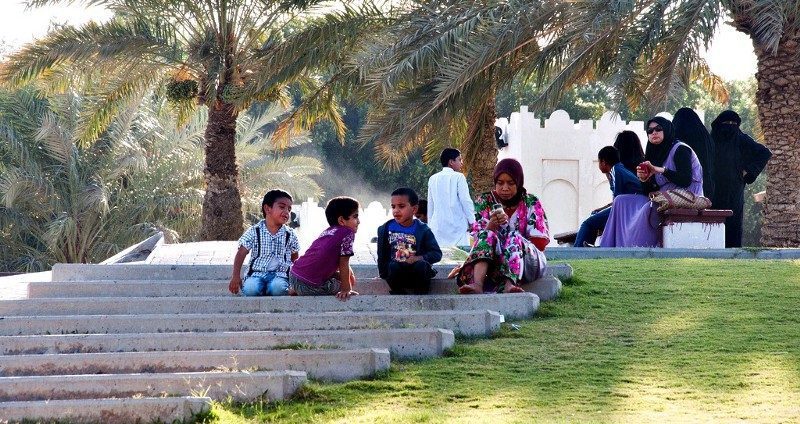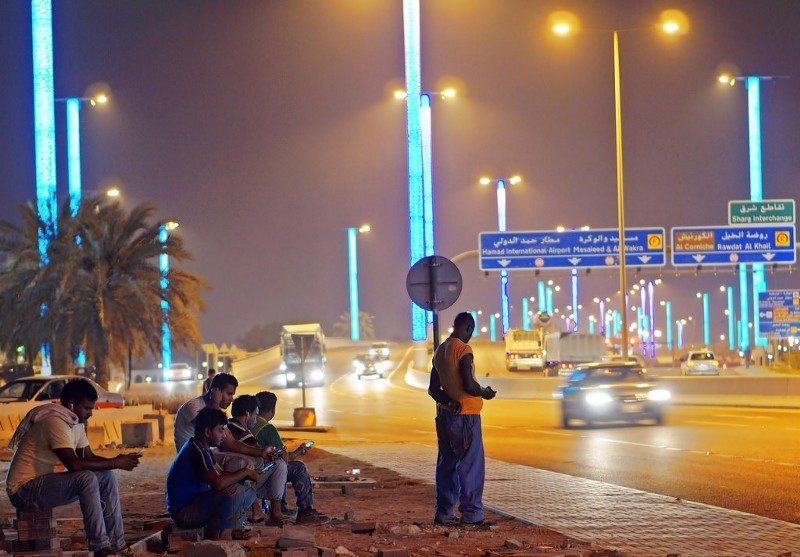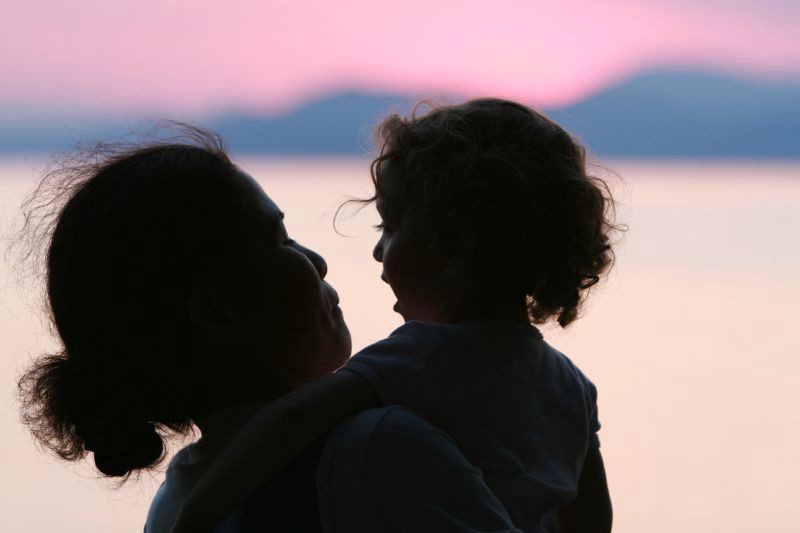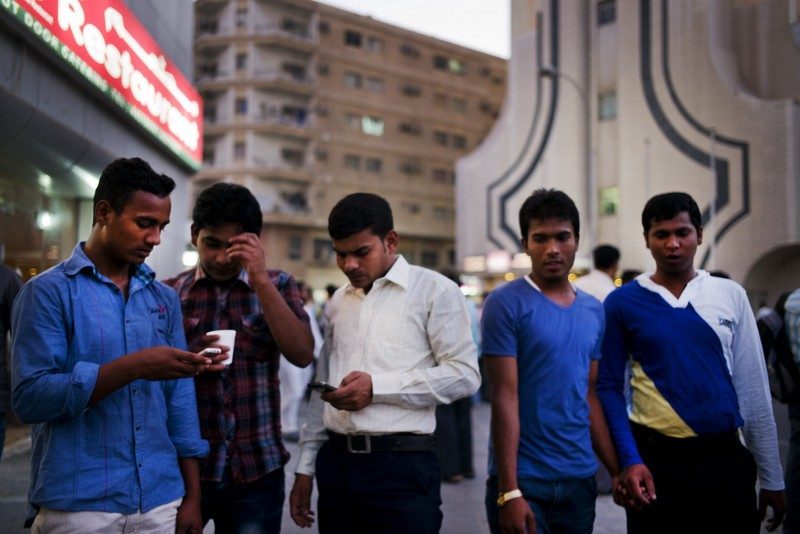By Vani Saraswathi

Last week, Doha News ran an opinion piece by a Qatari woman who argued that her country is being treated unfairly by the world’s press. Here, long-term Qatar resident Vani Saraswathi, Associate Editor of Migrant-Rights.org, explains why she disagrees.
When I was first asked to present a counterpoint in a debate about Qatar media coverage, I didn’t think I had anything new to say.
There were some points in “Why I believe that Qatar is being victimized by Western media” that merited a nod; but by and large it wasn’t a piece I agreed with.
When I read it, I was mostly thrilled that there were Qataris who respected Doha News enough to ignore its blocking by the government and to continue to send them their views.
Crowds gathered at nearly every US airport to protest President Trump's travel ban on seven Muslim-majority nations https://t.co/rxtbh0oTnn pic.twitter.com/Fbx2xd3xSw
— CNN (@CNN) January 30, 2017
Then thousands of miles away, an executive order was passed.
A powerful majority felt victimized and threatened, unleashing unimaginable misery on the vulnerable and disenfranchised.
A dear friend and co-worker was also affected, albeit not as badly or seriously as some others, as she herself admits.
Alongside all that anger and fury, what emerged was the power of the civil society.
Hundreds of thousands of citizens standing up for what they believed in, aware of their privilege and using it for a greater good.
The media were pushing back, not cowing down to pressure or bullying. Lawyers were gathering at airports to offer pro-bono services.
It was then that I revisited this opinion piece.
Playing the victim
For too long Qatar has played the victim card.
It blames countries that send migrants to its shores, and it blames the skewed population ratio, talking of “cultural dilution” by migrants, with no genuine attempt to accept blame or responsibility.

But if you live in Qatar, you do not need the “Western media” to reveal injustices. It’s in our face, day in and day out.
You see it in your workplace, you see it in ghettoized living spaces, you see it in how housemaids are treated, you see it in how construction workers lie around in the summer heat, and if you care enough to look into their faces of these lower-income migrant workers, you will also see it in their eyes.
But blue-collar workers are all but invisible in Qatar.
Most higher income migrants, aka expats, are too scared to speak up, as they have much to lose if they do. And the nationals obviously don’t think this is a real problem, meriting their censure.
So, I wonder what the author’s definition of dignity is, when she writes this:
“As a Qatari national possessing knowledge as well as a first-person perspective as to what truly occurs in our country and how our workers are treated with respect and dignity, I feel compelled to take some steps to separate facts from fiction and begin an educated defense.”
Domestic worker abuse
An educated defense would be to spend a few weeks with blue-collar and domestic workers, and then proving that the injustices you see are just exceptions and not the norm.
Simply parroting the government’s PR is too defensive.

In her piece, the author makes a passing reference to domestic workers.
“Meanwhile, Amnesty International has made similar claims…”
Doesn’t she think the 90,000 plus women working in Qatar as domestic workers, without laws to govern them, deserve more than a snide dismissal of the Amnesty report?
How can one live in Qatar and not understand the absolute power wielded over domestic workers, and their lack of options?
A large part of my work involves advocating for rights of domestic workers in the GCC, and to see such scant regard for the problems they face in an “educated defense” is disheartening.
Especially so from a Qatari woman, because they understand more than many others the desperate need for empowerment.
Good journalism
Yes, it is true enough that the media has misreported or sensationalized labor issues in Qatar over the last six years.
Two years ago, Migrant-Rights.org was among the first to call bluff on a very misleading Washington Post graphic, despite backlash from critics who said we were “going soft” on Qatar.

However, there has also been exemplary journalism (primarily by the Guardian) looking at problems no one else has bothered to report on.
This includes North Koreans being put to work in Qatar under inhumane conditions, and the fact that Nepali death rates are extremely high in Qatar.
The newspaper’s report actually triggered extensive study and research into what was happening. It found that lack of acclimatization significantly shortens lifespans of Nepalis not just in Qatar, but also in other Gulf states and Malaysia.
That’s what good journalism does. It lays bare the problems in a society, and allows experts then to do their job to resolve it.
Repeatedly, Qatar has been advised to investigate these deaths, but it still hasn’t. Had it taken that initiative, it would have probably saved some face.
Muzzled local press
Although I no longer live in Qatar, I still visit regularly for work.
And even though I never thought of Qatar as my home, I am extremely fond of the country and its people.

And that’s why I feel one must continue to debate this issue, and not dismiss it with fatalistic reasoning of “we are being victimized’ or “Qatar won’t ever change.”
If Qatar had a free and fair media — instead of the currently muzzled group of newspapers that amount to advertising supplements — there would have been better informed reporting locally.
This would negate to a large extent the need for “Western” media to “victimize” the country or report on it.
Providing lip service, saying “it’s not perfect but we are trying,” just doesn’t cut it.
Even if you are a minority, you are more powerful than the faceless and disenfranchised majority put together.
Thoughts?
The author is the Associate Editor of Migrant-Rights.org. The views expressed are her own, and do not necessarily reflect that of her organization, or of Doha News.






